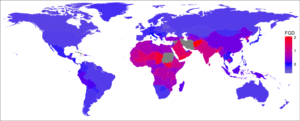David Garcia, Yonas Mitike Kassa, Angel Cuevas, Manuel Cebrian, Esteban Moro, Iyad Rahwan, Ruben Cuevas
Proceedings of the National Academy of Sciences
 Online social media are information resources that can have a transformative power in society. While the Web was envisioned as an equalizing force that allows everyone to access information, the digital divide prevents large amounts of people from being present online. Online social media in particular are prone to gender inequality, an important issue given the link between social media use and employment. Understanding gender inequality in social media is a challenging task due to the necessity of data sources that can provide unbiased measurements across multiple countries. Here we show how the Facebook Gender Divide (FGD), a metric based on a dataset including more than 1.4 Billion users in 217 countries, explains various aspects of worldwide gender inequality. Our analysis shows that the FGD encodes gender equality indices in education, health, and economic opportunity. We find network effects that suggest that using social media has an added value for women. Furthermore, we find that low values of the FGD precede the approach of countries towards economic gender equality. Our results suggest that online social networks, while suffering evident gender imbalance, may lower the barriers that women have to access informational resources and help to narrow the economic gender gap.
Online social media are information resources that can have a transformative power in society. While the Web was envisioned as an equalizing force that allows everyone to access information, the digital divide prevents large amounts of people from being present online. Online social media in particular are prone to gender inequality, an important issue given the link between social media use and employment. Understanding gender inequality in social media is a challenging task due to the necessity of data sources that can provide unbiased measurements across multiple countries. Here we show how the Facebook Gender Divide (FGD), a metric based on a dataset including more than 1.4 Billion users in 217 countries, explains various aspects of worldwide gender inequality. Our analysis shows that the FGD encodes gender equality indices in education, health, and economic opportunity. We find network effects that suggest that using social media has an added value for women. Furthermore, we find that low values of the FGD precede the approach of countries towards economic gender equality. Our results suggest that online social networks, while suffering evident gender imbalance, may lower the barriers that women have to access informational resources and help to narrow the economic gender gap.
Links
Selected Media Response
- Scientific American – Facebook Use Linked to Gender Equality
- Mic – Researchers are using Facebook data to study gender inequality
- Inverse – Why Do More Men Use Facebook in These Countries?
- Phys.org – New tool using Facebook data shows worldwide gender gap
- ORF – Geschlechterkluft auf Facebook
- El Pais – La brecha de género en Facebook refleja la desigualdad real